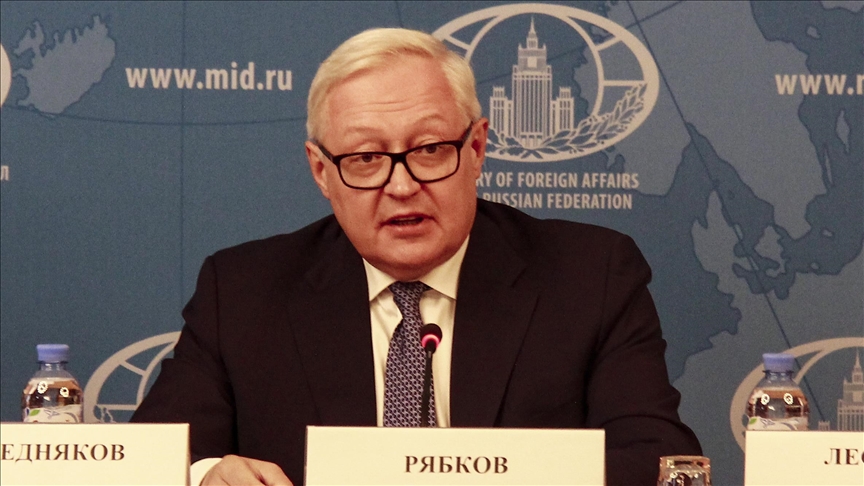

By Anadolu Agency
MOSCOW
Russia has divided foreign countries into “constructive, neutral and unfriendly” under its new foreign policy, Deputy Foreign Minister Sergey Ryabkov said on Thursday.
“Unfriendly partners” pose “existential threats to the security, sovereignty and development” of Russia, Ryabkov said in an interview with International Affairs magazine.
The US is named as an initiator of “a hybrid war,” and the new policy authorizes taking “symmetrical and asymmetric measures” in response to “unfriendly actions,” he said.
The approach to the indivisibility of security was changed, and now Moscow will only adhere to this principle on the condition of reciprocity, he added.
According to Ryabkov, “important innovations” relate to the conditions for the use of force in self-defense — not only to repel as before, but also to prevent an armed attack on Russia and its allies.
“However, priority in the settlement of international disputes is given to peaceful means,” he said.
Ryabkov stressed that the “threshold” for the use of nuclear weapons was not dropped, and provisions of the policy of nuclear deterrence “received a certain specification and further clarification.”
“Our enemies are cynically speculating on this situation, trying to attribute to us a missing intention to use nuclear weapons in connection with what is happening in Ukraine. There have been no changes in our approach to this complex and alarming issue,” he said.
Ryabkov said that Moscow will not return to the implementation of the Strategic Arms Reduction Treaty until the US abandons its deeply hostile attitude toward Russia’s foreign policy.
At the same time, he promised that Russia will comply with the restrictions on the number of strategic offensive weapons and will continue to exchange information on the number of launches of intercontinental and submarine-launched missiles.
Ryabkov criticized Britain and France for the lack of transparency on increasing their nuclear warheads and carriers, claiming both London and Paris “made a breakthrough, declaring a significant — by several dozen — increase in the number of their warheads.”
“Behind their PR lies the real modernization of nuclear forces in both the UK and France. They are pointing the finger at China, which is implementing its programs. They use this to escalate tensions, strengthen the division of the world into opposing blocs, and distract the international community from their large-scale programs for the development of nuclear arsenals,” he said.
Asked about Russia-US relations, Ryabkov said they are limited by protests aimed at warning Washington against “further escalation, mistakes and reckless steps” in Europe and Eurasia and to issues on ensuring the work of communication channels, including the work of embassies issuing visas and prisoner exchanges.
Moscow and Washington continue to maintain communication channels, test them from time to time to make sure that they work, he noted.
Ryabkov expressed certainty that there will be no default in the US and that the financial support of Ukraine would continue.
“For a default to happen in the US, in my opinion, something extraordinary must happen. The opposing forces…are playing the usual games. This is all a repetition of many times passed. As they say, bad deja vu,” he said.
He expects that “there will be enough money for everything,” including “color revolutions, the division of those who do not follow the US dictate, subordination of the disobedient, and for further deep penetration and control of international organizations.”
He does not expect any changes in the West’s policy because “the elites remain the same persuaded Atlantists.”
“Those in power in modern Western, Central and Eastern Europe are overwhelmingly convinced Atlantists, people with deep connections overseas, people who grew up there, studied, absorbed a specific Anglo–Saxon spirit, used to look down on others, and in their circle revel in Western megalomania,” he said.
Ryabkov described Russia’s withdrawal from the Treaty on Conventional Armed Forces in Europe as “a response to Finland and Sweden’s accession to NATO.”
“A group of NATO countries…are obsessed with the idea of inflicting a ‘strategic defeat’ on Russia. It was not Russia that was approaching NATO. It was NATO that moved closer and closer to Russia all the years after the collapse of the Soviet Union,” he said.
He does not expect any changes in case of Donald Trump’s election as US president because Trump had imposed “an unprecedented number of sanctions against Russia.”
“In the case of the US, I think that detente is not in the hands of any of the candidates for the post of their president. The matter has gone very far, consolidated the American ruling elite on an anti-Russian basis, regardless of its party affiliation,” he said.
He also said it is possible that despite accusations of Russia’s interference in the 2020 US presidential election turning out to be fake, similar campaigns might be launched again as the pre-election struggle would be taking pace.
The deputy foreign minister meanwhile said he had no data about reports claiming that 200 US conservative families may move to Russia and establish their own settlement.
As for the establishment of a BRICS (Brazil, Russia, India, China, South Africa) payment system, with a working name of BRICS Pay that will work in the territories of the five states, Ryabkov said “work in this direction is being carried out.”
On the establishment of a common currency, “much remains to be done before its practical implementation” and the BRICS countries are not ready yet for this, he added.
We use cookies on our website to give you a better experience, improve performance, and for analytics. For more information, please see our Cookie Policy By clicking “Accept” you agree to our use of cookies.
Read More